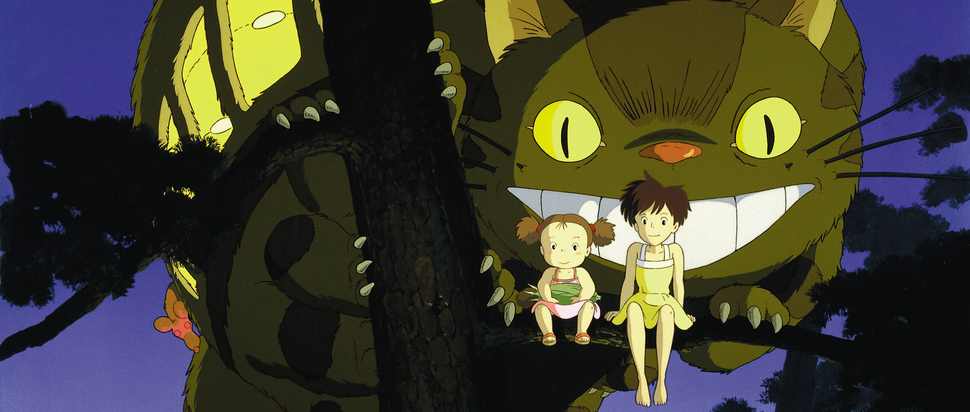Into the Ghibliverse: Michael Leader and Jake Cunningham on their new book
Michael Leader and Jake Cunningham have spent the last six years celebrating Studio Ghibli with their podcast Ghibliotheque. Their new book, Ghibliverse: Studio Ghibli Beyond the Films, dives even deeper and wider
For most cinephiles, Studio Ghibli, the animators behind all-time classics like Spirited Away and My Neighbor Totoro, need no introduction. But how much do you really know about them? Well if you listen to Ghibliotheque, the fantastic podcast from critics Michael Leader and Jake Cunningham that takes a deep dive into this legendary animation studio, you'll know a fair bit. Leader and Cunningham also explored the world of Studio Ghibli in print with Ghibliotheque: The Unofficial Movie Guide, and now they're digging into lesser-charted territory with the follow-up Ghibliverse: Studio Ghibli Beyond the Films.
This new read examines all the lesser-known cultural objects and moments that orbit Ghibli’s feature film releases – but what was the impetus for this direction? “We've been doing this for six years, and the longer that we do it, the more connections we uncover,” explains Cunningham. “By connections, that can mean talking with Domee Shi on the podcast and finding a link between her short Bao and My Neighbors the Yamadas [from Ghibli co-founder Isao Takahata], or it might be talking about [the Ghibli influence on 2021 Pixar animation] Luca, or it might be talking about music. We're constantly making these connections between Ghibli and other artists' work, but also the work that came before the studio and the work that happened because of the studio, and they are equally part of the story.
“We've always been surprised at how much of an audience there is. When we set up the podcast, we only planned initially six episodes, because we thought, right, we'll do six and see how it goes, and if there's an appetite for that, maybe we'll do some more. And then that kind of philosophy seems to have been with us through every different aspect of this entire project.”
Although Ghibli films are much-loved by audiences globally, they (along with anime more broadly) haven’t typically been accepted into the Western canon of great cinema, especially among arthouse distribution and audiences – which is where Leader and Cunningham have sought to make a difference. “We wanted to put [Studio Ghibli] on a pedestal with the sorts of filmmakers that would get this treatment elsewhere in podcast or book form,” says Leader. “When we go out on the road, it's funny how we're put in the same bracket as fandom, but we always wanted to put these films on in cinemas where they sit side by side in the programme with the latest releases. And we've always been surprised by who's turning up!”
Take, for example, their recent screening of the little-seen 2004 psychedelic gem Mind Games from Masaaki Yuasa, which they programmed at the massive IMAX at BFI Southbank back in August. “It’s possibly the most offbeat thing we've shown – we had 170 odd people turning up to the IMAX to see it, and I'd probably say 80% hadn't seen it before,” says Leader.
Even for people who have seen most – or all – of Studio Ghibli’s films, there’s still plenty to discover. “Ghibli is so much bigger than the films,” continues Leader, “particularly in the last few years, with the success of the stage productions, and with the park and museum becoming not just holiday destinations but pilgrimage destinations. It shows that even though Ghibli did release another film with The Boy and the Heron, there is so much more to them than just what's on the screen.”
For many (myself included), Ghibli can become a bigger part of your life beyond the screenings. Cunningham and Leader have captured this idea with Ghibliverse in ways inspired by their own unique engagement with the studio. “I'm not somebody who obsessively re-watches films, but some people do, and so it can become part of your life that way,” says Leader. “But you might get the tattoo, and be looking at Ghibli all day long; it's literally etched into your skin.
“Jake wrote the music chapter in this new book, and makes the very good point that he's spent more time listening to [regular Ghibli composer] Joe Hisaishi’s music than he's ever spent watching the Ghibli films. So in a way, that is the primary Ghibli influence in his life.”
With all this research, there was bound to be a few facts or experiences that caught the pair off guard – so what was their most surprising discovery? “That the Ghibli Park is more than the sum of its parts,” says Cunningham, “and that it has become its own artwork and not just a great tribute or memorialisation. It’s the crowning achievement of Goro Miyazaki [son of Ghibli co-founder Hayao Miyazaki] – it's quite a phenomenal piece of architecture and design.”
Ghibliverse: Studio Ghibli Beyond the Films is published 10 Oct by Hachette UK
The latest Ghibliotheque podcast series, The Shinkai-deology, is currently available wherever you get your podcasts
Cunningham and Leader have curated Film in Print, a free series of talks at London Film Festival about film writing, which run 12-13 Oct at gallery@oxo in London
